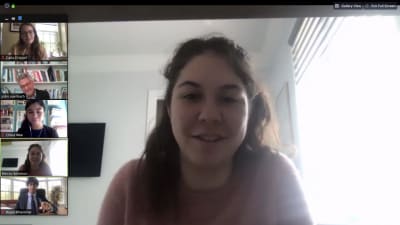Spring 2020 presents capstone policy document
Will you be ready when you testify before Congress? Argue before the Supreme Court? Defend your PhD thesis? After the past few weeks, each of our students is more prepared for these challenges. The reason? Their capstone collaborative policy document experience.
The collaborative policy document (or “CPD,” as our students call it) is arguably SEGL’s most difficult academic challenge. Each SEGL cohort must select a current international crisis, research that crisis and collaboratively craft a 40-page scholarly document which is then presented and defended in front of real-world policymakers.
This semester chose preventing the next pandemic as its topic. (The cohort revised its original choice–the Kashmir conflict–after Spring Break proved a turning point for the virus.)
After this decision, the students split into six sub-groups, each with a different area of expertise. They then spent a (virtual day) in the George Washington University main library, with full access to the University’s resources. David Ettinger (the top international relations/political science research librarian at GW), who has been a student favorite since our first semester, started with an entertaining orientation session so that the students know how to use the myriad databases in the GW system (this is also good preparation for undergraduate life!), and then the students were off to research.
The groups investigated the current situation and drafted dozens of policy recommendations. The research process also involves reaching out to experts for phone interviews. (This requires ingenuity and a bit of courage and often leads to excitement and insight.) The students also spent a morning presenting and defending preliminary research before a faculty mock panel of experts–the notorious “Review Panel”–each of whom asked questions as stridently as a Supreme Court Justice, Member of Congress, or dissertation committee member might. (Ask a student for the Panel’s unofficial name!)
After compiling their research for several days, the students created rough drafts that our faculty critiqued. Students discuss, disagree, research, and revise, and then it is time for the final presentations. Each semester we try to meet with on-the-ground policymakers who have the ability to incorporate our students’ ideas into actual policy.
This fall we visited with two experts. Our first presentation was before Abby McCartney, who is part of Senator Elizabeth Warren’s policy team. Warren recently penned an op-ed in The New York Times about the best way to respond to the virus, which many of our students used to inform their research. McCartney’s questions pushed our students, and her review was both positive and forward-looking.
Our second presentation ratcheted the stakes up several notches. John Auerbach is President and CEO of the Trust for American’s Health (a leading nonpartisan health policy advocacy organization), former Associate Director of the CDC, and former Massachusetts Commissioner for Public Health. As such, he brought a vast expertise and many penetrating, Socratic questions to our conversation, which forced our students to consider both classic and COVID-19-specific policy challenges.
The students afterwards were satisfied and relieved. They had done the research and had the preparation to engage in meaningful conversations about a complex current issue with experts. An outstanding achievement!
Want to read the document for yourself? You can download it here.





















